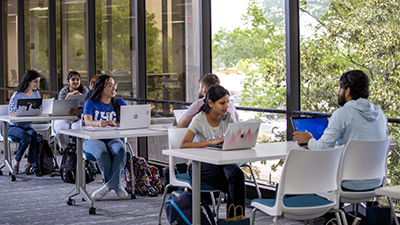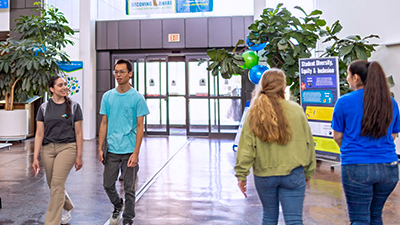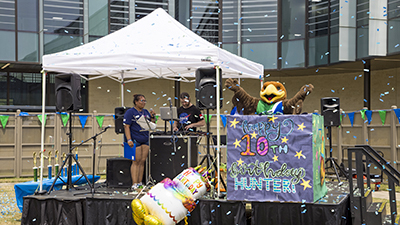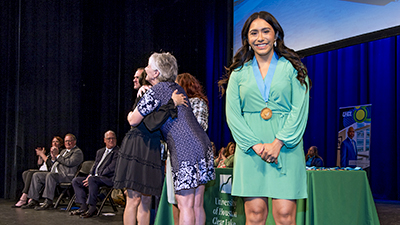Connecting to College improves accessibility for students with autism
Most colleges have support programs for disabled students, but many of those programs don't address some specific needs of students on the autism spectrum. For this reason, says the Hechinger Report, a national nonprofit that reports on education-related topics, only about 36% of students on the spectrum participate in any kind of post-secondary education, compared to two-thirds of all high school graduates.
That's why the Connecting to College program at University of Houston-Clear Lake was implemented, and since 2016, says Professor of Psychology Dorothea Lerman, 52 students on the autism spectrum have been served. She said that families were telling her their student is capable of achieving a college degree, they just need some extra support specific to individuals with autism.
Lerman explained that CtC works in partnership with Student Affairs, which has a number of programs for students, including career services, counseling services, and academic coaching. "What's important is that students with autism often don't request what they need. The services are there, but they don't ask for them, so we support them in understanding how to access these services," she said. "We also work on social goals, time management, and organization."
The program's success in supporting students has made a huge difference in their ability to adjust to life on a college campus. "Word about our success with CtC has really gotten around; in fact, Lee College, from which a lot of our students transfer, asked us to help them set up a CtC program on their campus," Lerman continued. "We all believe that if students start receiving support even before they coming to UH-Clear Lake, they will need less support when they get here and be more successful."
K-leigh Villanueva, counselor for students with disabilities at Lee College, said that when she looked at UHCL's CtC program, she knew it was the right program model for them. "I am an individual with hidden disabilities," she said. "I found the CtC mode at UHCL promotes practical, evidence-based intervention strategies that can be adapted, utilized, and applied in multiple situations, promoting lifelong independent skills-building."
Megan Dora is a third-year graduate student in the Behavior Analysis program and is the program coordinator and transition specialist in the CtC program. "I meet with UHCL students with autism or related needs who would like to be more successful in their college career," she said. "They either come to us because they realize they need the support, or they are referred to us through the Accessibility Support Center. Together, we identify a variety of academic, social or professional goals and anything else they would like to work on this semester."
She said she coordinates the program and another graduate student works with her to support CtC students. Between them, they are currently serving 10 students. "I see the benefits in many ways," she said. "Since the pandemic, a lot of goals we have been working on pertain to success in online classes — improving communication with professors, keeping track of due dates and time management. I have seen students improve a lot in those skills."
She'll be assisting Lee College as they implement their CtC program, she said, by consulting with them, attending their staff meetings, and becoming part of the information transfer process.
Dora added that all the students she works with make their own decisions about what they want to work on. "We don't require students to work on specific goals; we want them to choose what it important to them," she said. "Only rarely do we have a crisis intervention, when there is an issue that involves the dean of students or potentially disciplinary actions."
Dean of Students David Rachita said that when the first freshman cohort entered UHCL in 2012, he became concerned because there was a corresponding increase of students on the autism spectrum who were having challenges coping with life on campus.
"I was starting to have code of conduct complaints against students who were on the spectrum because not everyone was able to fully understand those characteristics," Rachita said. "They just saw a 'problem.' But there are reasons for some behaviors, and I believed we should handle this differently."
When his office learned about CtC, he said, it was a natural resource. "I was able to stop a situation from turning into a conduct problem that didn't need to happen," he said. "I was able to refer them to CtC and mitigate the situation."
Rachita said he was convinced that what could have turned into many conduct issues have resulted in zero conduct issues. "These graduate assistants have worked with me as a team to make a plan," he said. "It has been really successful. When I say zero conduct issues now, I really mean zero conduct issues with students on the spectrum."
Lerman said families tell her their student is capable of achieving a college degree, they just need some extra support to specific to individuals with autism. "We have been getting many contacts from families who say they have specifically chosen to send their student to UHCL because we are one of a very few universities in Texas with a program like this," she said.
Learn more about UHCL's Behavior Analysis program online.







